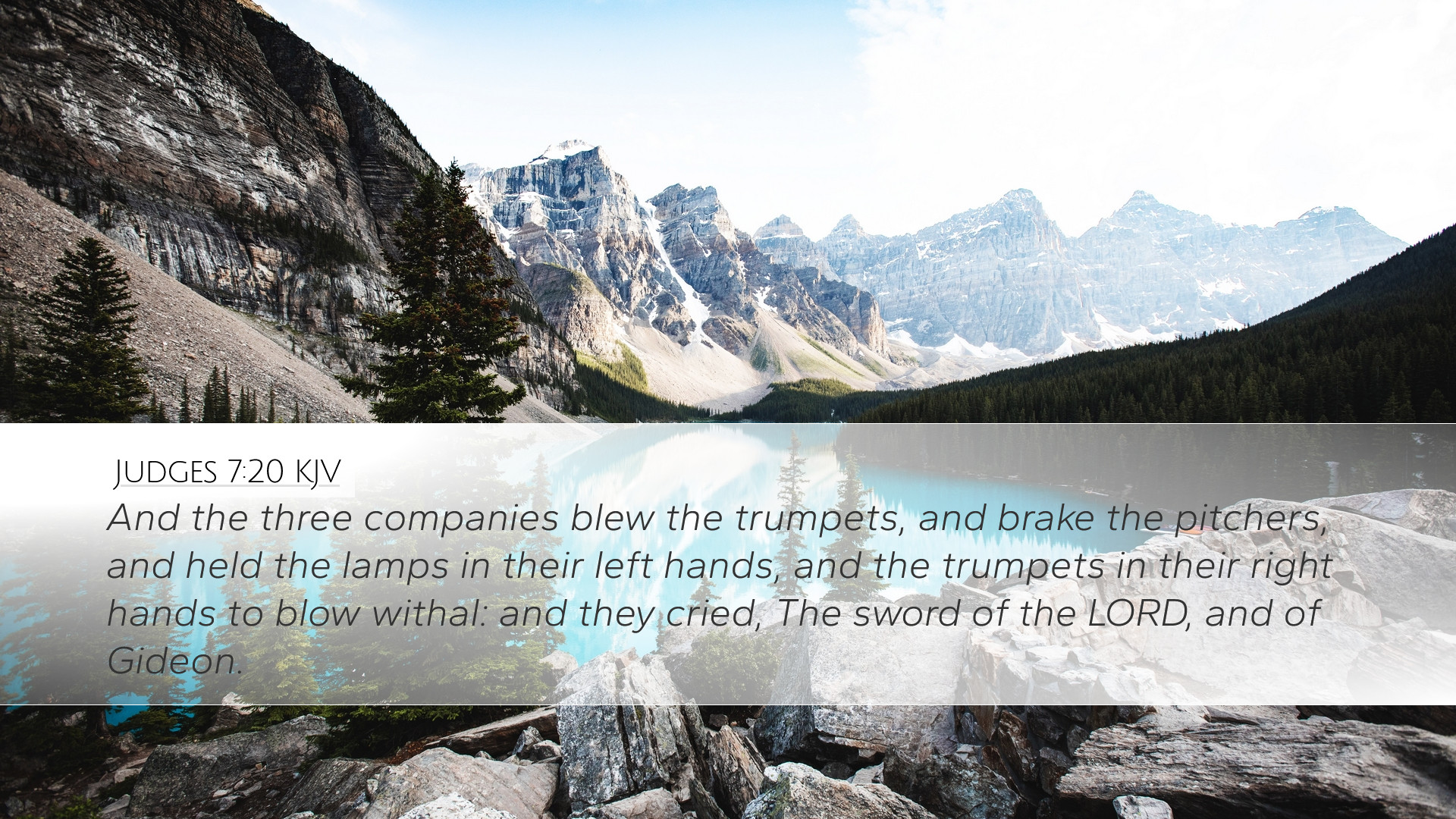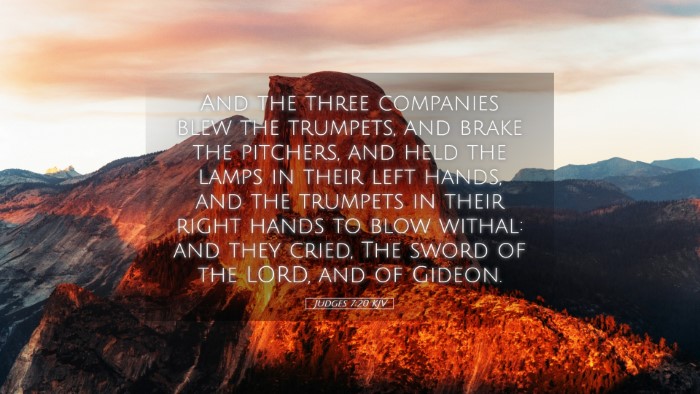Old Testament
Genesis Exodus Leviticus Numbers Deuteronomy Joshua Judges Ruth 1 Samuel 2 Samuel 1 Kings 2 Kings 1 Chronicles 2 Chronicles Ezra Nehemiah Esther Job Psalms Proverbs Ecclesiastes Song of Solomon Isaiah Jeremiah Lamentations Ezekiel Daniel Hosea Joel Amos Obadiah Jonah Micah Nahum Habakkuk Zephaniah Haggai Zechariah MalachiJudges 7:20
Judges 7:20 KJV
And the three companies blew the trumpets, and brake the pitchers, and held the lamps in their left hands, and the trumpets in their right hands to blow withal: and they cried, The sword of the LORD, and of Gideon.
Judges 7:20 Bible Commentary
Commentary on Judges 7:20
Judges 7:20 states: "The three companies blew the trumpets and broke the pitchers; they held the torches in their left hands and the trumpets in their right hands, and they cried, ‘The sword of the Lord and of Gideon!’" This verse encapsulates a pivotal moment in the narrative of Gideon’s victory over the Midianites, illustrating both the strategic and spiritual dimensions of the battle.
Contextual Overview
Prior to reaching this verse, Gideon, chosen as a judge, had a unique calling characterized by uncertainty and the need for assurance from God. Through a series of signs, God confirmed Gideon's leadership and intentions (Judges 6). The assembly of soldiers dwindled from 32,000 to just 300, emphasizing the divine nature of victory that would be achieved (Judges 7:1-8).
Analysis of the Verse
The Act of Blowing the Trumpets
The blowing of trumpets served as a call to arms in ancient Israel. Matthew Henry notes that the sound of the trumpet rallied the warriors and symbolized their readiness for battle. It was a divine proclamation against the Midianites, signifying God’s initiative in the forthcoming victory.
Breaking the Pitchers
The breaking of the pitchers symbolizes the revelation of light and the unveiling of God’s power. Albert Barnes suggests that the act exposed the torches—representing the illuminating presence of God in the midst of chaos. In a spiritual sense, this moment emphasizes that God’s strength shines brightest in our weakness.
Holding the Torches
The torches represent the light of God’s glory. Adam Clarke notes that during the dark hours of night, the flashing light signified the dawn of victory. It is an important reminder that even in darkness, the light of God prevails over any adversary.
Crying ‘The Sword of the Lord and of Gideon’
This proclamation reflects both the divine endorsement and the human agency in the battle. The phrase underscores the belief that God fights alongside His people, as emphasized by Matthew Henry. It is a declaration of faith—recognizing that the victory does not stem from military might but from standing firm in God’s promise.
Theological Implications
Judges 7:20 integrates profound theological truths relevant to both ancient and modern audiences. The strategic actions of Gideon and his men exemplify faith in God's methodology, reminding the church today of the importance of divine guidance in endeavors.
Divine Strategy
The unconventional tactics employed by Gideon caution against reliance on human wisdom. In the face of overwhelming odds, this passage teaches that God often chooses the foolish things of the world to shame the wise (1 Corinthians 1:27). The effectiveness of the battle was rooted in obedience to God’s commands, rather than conventional warfare.
The Nature of True Worship
Worship, as expressed in this verse, combines action with proclamation. The broken pitchers and the raised torches signify the offering of oneself to God, wherein the battle cry mirrors an act of worship. True worship involves recognition of God's sovereignty and the declaration of His deeds.
The Light in Darkness
The illumination from the torches serves as a metaphor for Christ, who is the light of the world (John 8:12). Just as Gideon's men illuminated the night in a moment of battle, believers are called to reflect the light of Christ in the world’s darkness. The themes of illumination and revelation are central to the believer's walk with God.
Conclusion
Judges 7:20 is a rich narrative that resonates with themes of divine intervention, faithfulness, and the light of God in darkness. For pastors, students, theologians, and Bible scholars, it serves as a reminder that God's methods often defy human reasoning. It encourages an attitude of worshipful obedience and inspires confidence in God’s sovereign ability to deliver His people. As Gideon declared victory through the prophetic act guided by God, so should believers today proclaim the victory of Christ over the forces of darkness.


